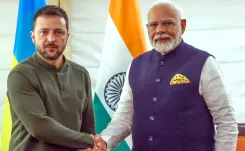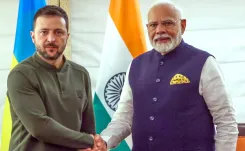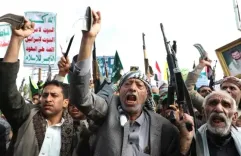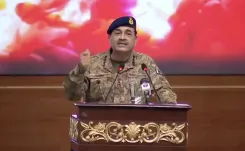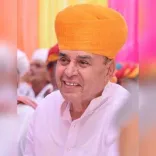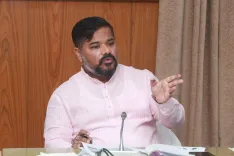Can PM Modi's First China Visit in Seven Years Reset New Delhi-Beijing Relations?
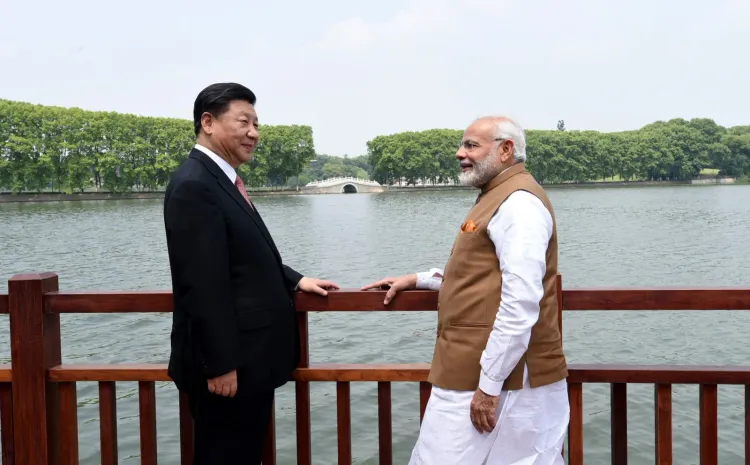
Synopsis
Key Takeaways
- PM Modi's visit to China is his first since 2018.
- A significant bilateral meeting with President Xi Jinping is scheduled.
- India and China aim to stabilize ties through structured dialogue.
- Recent trade developments reflect a strong commitment to cooperation.
- The resumption of cultural ties, like the Kailash Mansarovar Yatra, is pivotal.
Tianjin (China), Aug 30 (NationPress) Prime Minister Narendra Modi's arrival in Tianjin on Saturday for the annual Shanghai Cooperation Organisation (SCO) Summit signifies his first trip to China since 2018.
The visit from August 30 to September 1 is perceived as a crucial diplomatic opening to recalibrate India-China relations, which have experienced various phases of engagement, caution, and recent stabilization efforts.
Upon arrival, PM Modi received a warm welcome from the Indian community. He is set to engage in a significant bilateral discussion with Chinese President Xi Jinping on Sunday, during the summit.
India and China established diplomatic relations on April 1, 1950, making India the first non-socialist nation to recognize the People's Republic. However, the 1962 border conflict severely impacted relations. A pivotal moment occurred during Prime Minister Rajiv Gandhi’s visit in 1988, which initiated a slow normalization process.
Key milestones in this journey included: 2003: PM Atal Bihari Vajpayee's visit and the initiation of the Special Representatives mechanism on boundary issues; 2005: Chinese Premier Wen Jiabao’s visit to India, leading to a Strategic and Cooperative Partnership; 2014: President Xi’s visit for a Closer Developmental Partnership; 2015: PM Modi’s reciprocal trip to China; and informal summits in Wuhan (2018) and Chennai (2019).
Relations became strained following the Eastern Ladakh border tensions in April-May 2020. Nevertheless, recent interactions—especially the positive meeting between PM Modi and Xi Jinping at the 2024 BRICS Summit in Kazan—suggest a cautious reset.
Despite some setbacks, both nations have maintained a vigorous schedule of engagements, including at multilateral forums like G20 Hangzhou (2016), BRICS Goa (2016), SCO Astana (2017), and G20 Bali (2022).
External Affairs Minister (EAM) S Jaishankar and Chinese Foreign Minister Wang Yi have met several times, most recently during the 2025 SCO Foreign Ministers’ Meeting in China, followed by Wang Yi's visit to India for the 24th round of Special Representatives-level boundary discussions.
These meetings highlight both nations' commitment to stabilizing ties through structured dialogue and practical confidence-building measures.
The Special Representatives mechanism, initiated in 2003, is crucial for managing complex boundary issues. To date, 24 rounds have occurred, with the latest focusing on disengagement efforts in Eastern Ladakh. Complementing these are 27 rounds of the Working Mechanism for Consultation and Coordination (WMCC) and 19 Senior Commanders' meetings, the most recent held on August 13-14, 2023, alongside water cooperation through the Expert-Level Mechanism, which has met 14 times, most recently in June 2023, to exchange hydrological data and discuss emergency responses.
These multi-faceted dialogues have helped prevent further escalation and promote transparency along the Line of Actual Control (LAC).
A significant development in 2025 was China’s decision to lift longstanding restrictions on exporting fertilizers, rare earth minerals, and tunnel boring machines to India. This breakthrough followed the August 2025 meeting between Jaishankar and Wang Yi in New Delhi, promising a boost to Indian infrastructure, clean energy, and fertilizer sectors.
Even as bilateral trade has remained strong despite tensions, this move is viewed as a substantial confidence-building measure aimed at addressing disparities and facilitating targeted cooperation in non-sensitive sectors.
In a move celebrated by both nations, the Kailash Mansarovar Yatra was resumed in 2025, reviving one of the oldest and most significant cultural ties between the two countries. Both sides have also committed to resuming visa processing for nationals and are currently negotiating the revival of direct flight connections between major cities.
These initiatives are expected to foster trust and familiarity at the societal level, essential for long-term normalization.
Besides his engagement with Xi Jinping, PM Modi will meet Russian President Vladimir Putin on the sidelines of the SCO Summit. The two leaders are anticipated to discuss ongoing conflicts in Ukraine and Gaza, as well as global economic stability amidst lingering effects of Trump-era tariffs.
As global alliances evolve rapidly, India continues to navigate a path of strategic autonomy, enhancing cooperation with diverse partners while remaining anchored in national interests and multipolar engagement. As the SCO Summit progresses, PM Modi's first visit to China in seven years signifies much more than a mere return to the negotiating table; it embodies a potential strategic recalibration aimed at managing differences while fostering cooperation where mutual interests converge.

